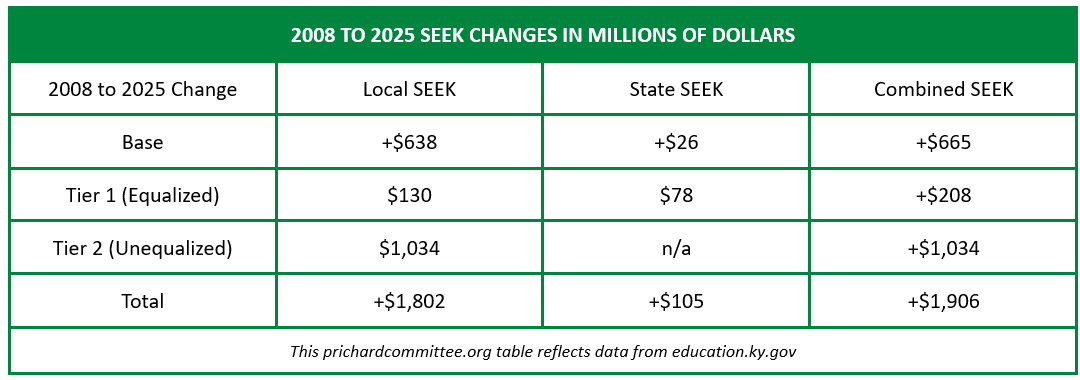Nov. 19, 2024
Contact: Lisa McKinney, Communications Director, The Prichard Committee
(cell) 859-475-7202
lisa@prichardcommittee.org
New Survey Reveals Kentucky Families’ Perceptions of Education Opportunities
Parents report strong satisfaction with mental health services while identifying need for expanded learning opportunities and deeper family engagement
LEXINGTON, Ky -- The Prichard Committee for Academic Excellence released findings from a new study examining how Kentucky parents view educational opportunities in their communities. "The State of Educational Opportunity in Kentucky" captures the experiences of more than 400 parents and guardians of school-aged children in the commonwealth, providing valuable insights into how families identify both the strengths of our public education system, as well as areas for improvement.
"The overwhelming show of support for public education at the ballot box with the recent defeat of Amendment II presents a critical opportunity for Kentuckians to engage deeply in a conversation about ways to continue to improve our state's education outcomes," said Brigitte Blom, president & CEO of the Prichard Committee. "This survey is an important first step toward identifying what we are doing well and finding solutions for areas that need improvement."
Parents report higher satisfaction than most states in two key areas:
- Parents give Kentucky schools high marks for mental health support. Kentucky has the highest percentage of families in the nation who are very satisfied with how their school supports their child's mental health needs at 45%, compared to the national average of 37%.
- Kentucky families express strong confidence in college and career preparation, with parents across all income brackets reporting higher confidence in workforce preparedness than the national average. However, there is an 11- to 13-percentage point difference between families with low- and mid-high-incomes, suggesting lower-income families feel less confident about their child's preparation for success.
Parents report several areas where they face challenges accessing educational opportunities:
- Families report limited access to summer learning programs. Only 31% of Kentucky parents surveyed say their children participate in these programs, compared to the national average of 41%. More concerning, parents' responses reveal a 14-point gap between income groups: while 38% of students from mid-high-income families participate in summer programs, only 24% of students who come from low-income families do.
- Few parents report their children receive tutoring services. Only 14% of parents say their children receive tutoring, below the national average of 19%. Again, we see a significant income-based disparity in reported access, with a 12-point gap between students who come from low-income and mid-high-income families.
- Parents describe low levels of engagement with their schools. While parents report being aware of their school's academic performance, they indicate much less familiarity with school operations and governance. Only 20% of respondents say they have attended meetings held by parent organizations at their schools, 5 percentage points below the national average. Only 16% of parents say they are familiar with how school budget decisions are made, placing Kentucky near the bottom quarter of states nationally on these measures.
"Research consistently shows that extended learning opportunities, such as tutoring and summer programs, and strong family engagement are two critical components for student success," said Todd Baldwin, vice president and director of the Center for Best Practice and Innovation at the Prichard Committee. "Over the coming year, we'll be working to identify and elevate promising practices from Kentucky communities that are finding innovative ways to expand learning opportunities and strengthen family partnerships. We know these solutions exist in our communities - our goal is to help share these examples so other school-communities can learn from and build upon their success."
The Kentucky survey was part of "The State of Educational Opportunity in America: A survey of 20,000 Parents," produced by 50CAN and Edge Research, one of the largest studies of parent perceptions of education in the United States in the past decade. The Kentucky sample of 404 parents and guardians represents diverse backgrounds across geographic regions, income levels, and school types.
"A great school is one that sits at the center of an engaged and supportive community," said Blom. "When the school and community collaborate to leverage assets in support of expanded educational opportunity, students benefit, families express increased satisfaction, and educators can focus on high-quality instruction."
For more information about the survey or access to the full Kentucky report, visit the Prichard Committee website. For more information about the national survey, and to access the full data set, visit 50can.org.
About the Prichard Committee
We believe in the power and promise of public education – early childhood through college - to ensure Kentuckians’ economic and social well-being. We are a citizen-led, bipartisan, solutions-focused nonprofit, established in 1983 with a singular mission of realizing a path to a larger life for Kentuckians with education at the core.
About 50CAN
50CAN: The 50-State Campaign for Achievement Now is a locally led, nationally supported nonprofit education advocacy organization committed to a high-quality education for all kids, regardless of their address.
About Edge Research
A woman-owned marketing research company and trusted partner, Edge Research tells data-driven stories that make our clients’ programs, products, and brands successful, because we believe in conducting purposeful and impactful work. Our goal is to blend wisdom, experience, creativity, and innovation to drive change. One of Edge’s key verticals is education, which ranges from early childhood development to K-12 and postsecondary education, to lifelong learning.












